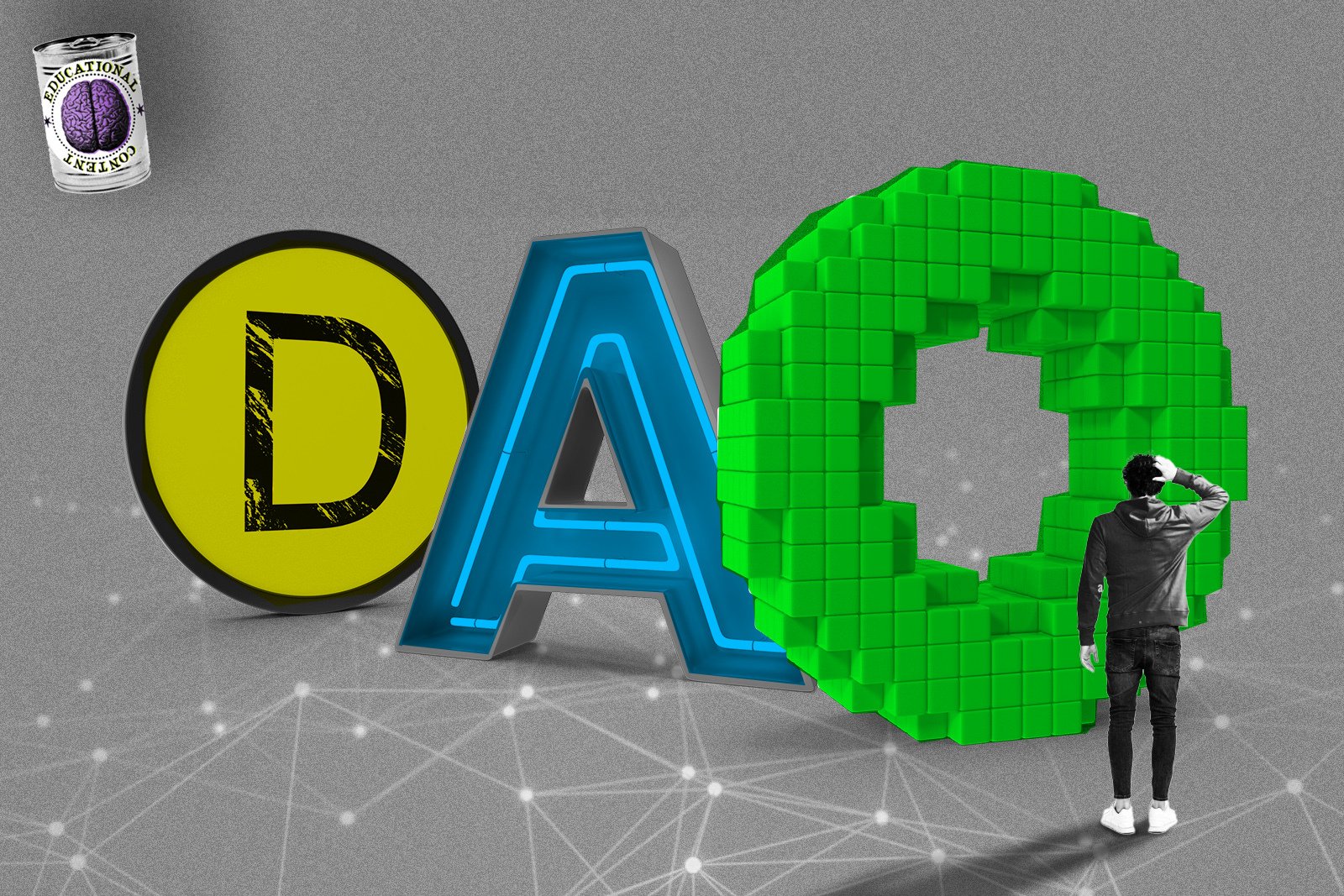
New startups. The future of companies. The revolutionary definition of how we approach work.
These and more are often said about the next big trend in crypto and ownership economy: decentralized autonomous organizations (DAOs).
Sponsored
So what are they, how do they work, and how are DAOs changing business landscape?
What Is a DAO?
A DAO, which stands for decentralized autonomous organization, is designed to bring a decentralized, automated governance model to business entities.
Simply put, it is an entity that is ‘collectively-owned’, which runs by utilizing self-executing, open-source smart contracts as opposed to a sole central authority such a board of directors. There is no hierarchy in decentralized autonomous organizations, and no one in charge.
Sponsored
DAOs don’t have a traditional management structure as all governance rules and working models of a given DAO are recorded on the blockchain. Because public smart contracts cannot be changed or deleted without notice, DAOs are completely transparent in their operation and capable of acting autonomously.
The first-ever DAO was formed back in 2016 after a crowdfunding campaign raised over $150 million in funding through token sales on the Ethereum blockchain. At the time, it was one of the biggest crowdfunding campaigns in crypto history.
How Do DAOs Work?
The rules of a DAO’s working model are written into transparent and immutable smart contracts.
The only way to implement changes in a DAO’s smart codes is through community votes. Most DAOs are open organizations, allowing new members to join them by buying its respective cryptocurrency.
Each member has voting rights in the organisations its governance, and can cast their verdicts by voting on proposals and protocol updates. The voting weight of each DAO member is proportional to the number of governance tokens they hold.
Whenever voting members agree on a given protocol change, the updates are encoded into the smart contracts and voters receive automatic rewards for their participation. Typically, the ownership of governance tokens does not grant holders any further rights or privileges.
DAO communities decide for themselves how they will be funded. Most typically use governance tokens that can be bought on decentralized exchanges (DEXes), or earned by providing market liquidity.
Some other types of DAOs employ other forms of capital generation, such as using cryptocurrencies or NFTs to reflect the power of each member’s vote. These are “share-based” DAOs, and tend to be less accessible than DAOs based on token ownership.
How Does a DAO Make Money?
Although DAOs are a novel business technology and model, they are not an entirely alien business idea. The way decentralized autonomous organizations make money is not too different from how traditional business companies.
Governance tokens can be compared to shares in a traditional company, which give shareholders influence in decision making processes. On the other hand, in a DAO, you gain this privelege as an investor in, and it is on you to decide what to do with the DAOs treasury, which, in most cases, increases over time.
Thus as a governance token holder of DAO, you may expect to make money through dividends from your investment, or through the growth of your governance token’s value.
What Are the Benefits of DAOs?
- Decentralization
DAOs have no central, single entity in control of the entire organization. The power to affect decisions is given to each token holder, so anyone can become a part of DAO.
This makes DAOs less vulnerable to human error, corruption, and possible manipulation or machination. Governance which is shared between all DAO members makes the entity more secure.
By eliminating traditional business infrastructures and hierarchy, DAOs redefine how innovations and communities are built, incubated, and scaled.
- Automation
Employing smart contracts means the automation of all transactions. This means that, whenever the encoded conditions are met, the contracts are executed instantly. No human input is required to complete the task.
This not only saves time, but also makes transactions cheaper overall. Smart contracts additionally carry out transactions directly between the relevant parties, eliminating the need for intermediaries and their associated costs.
- Transparency
DAO smart contracts are open-source and public. The code and data are available for anyone to check at anytime, and no changes go unnoticed as each and every iteration is recorded on the blockchain, and blockchain itself has no owner.
This makes blockchain-based DAOs highly transparent organizations, whose working model and key rules can only be changed by the general consensus of participating members.
What Risks Are Involved with DAOs?
- Regulations
Currently, DAOs operate as shared investment funds, crowd sourced capital pools, or entities outside the regulatory spectrum entirely. This means there is a lot of legal uncertainty, and a number of, often unanswered, questions.
For example, questions are often raised around how DAOs should be treated under the the current legal systems, and whether their private members should carry the responsibility for a DAOs debts and legal liabilities. Most common is the question of how generated income should be taxed.
The lack of legal certainty may also act a barrier for DAOs looking to attract institutional capital.
- Security concerns
The first-ever DAO, also known as “The DAO,” made history with its massive fundraising success, however its reputation was quickly ruined after $60 million was stolen from the protocol because of a loophole left in its code.
As all changes to DAO smart contracts require a general consensus and voting, it may prove difficult to fix any fatal bugs in the system, even should they be detected.
- Slow decisions
Organizational structures with multiple stakeholders are typically slow to react to market changes, simply because they require approval from all sources before they can react. DAOs face the same potential problem.
- Not fully autonomous
Although controlled by self-executing smart contracts and democratic votes, DAOs are not fully autonomous. They are still written and coded by humans who had to set up the rules and put them in place to even begin the decision-making system of the DAO.
At the same time, you influence in decision-making and voting power both depend on how many governance tokens you possess. Whoever has the most capital invested in DAO, has the highest amount of control.
Not to mention the risks associated with the governance token issuers themselves, who may also operate with some degree of centralization, keeping the majority of tokens to themselves as a result.
Why You Should Care
Having been born six years ago, DAOs are going through a renaissance of sorts, and are expected to grow, mature, and become a mainstream technology in the near future. As entrepreneurs worldwide look for new ways to run their businesses, DAOs may become a widely adopted organizational structure that can be applied to a range of business cases.
